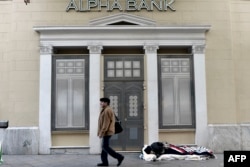Greece and its lenders resumed a long-stalled review of its bailout Tuesday, with the government in Athens braced to commit to yet more austerity in exchange for the funds the country needs to remain solvent.
The review has dragged on for months, partly because of a rift between the European Union and the International Monetary Fund over Greece's fiscal goals and prospects next year — when the current rescue program expires — and beyond.
To help break the impasse, the leftist-led government last week agreed to pre-legislate economic reforms, including cuts in income tax breaks and pensions, to come into effect from the start of 2019, the year the next parliamentary elections are due.
The lenders are asking Greece to make extra savings worth 2 percent of gross domestic product in order to meet a target of a 3.5 percent primary surplus — which excludes debt servicing costs — that they have set for 2018 and the post-bailout period.
"The lenders' representatives will ask for measures of 1 percent from lowering the tax-free threshold and another 1 percent from pension cuts," an official with knowledge of the negotiations in Athens told Reuters on condition of anonymity.
The government estimates the 2016 primary surplus will exceed 2 percent of GDP, well above the lenders' 0.5 percent target, after the economy unexpectedly returned to growth last year.
"Without publicly saying it, Athens wants the total [additional] measures to be worth around 1.5 percent of GDP, after the better-than-expected surplus and better economic performance," a second source close to the talks said.
"The institutions could discuss a gradual implementation of the pension cuts," the second official said.
More debt relief, belt tightening
The IMF, still undecided on whether to participate in what is Greece's third rescue package, says Athens cannot meet its targets unless it is granted further debt relief and adopts extra belt-tightening measures.
Greece's European lenders, notably Germany, oppose debt relief.
The uncertainty has fueled fears of a new financial crisis among investors already nervous about how a populist revival in the eurozone will affect close-fought election races in the Netherlands, France and Germany between now and the autumn.
Greece does not need more loans until the third quarter, but if bailout funds are not paid in time it will face an elevated risk of defaulting on debt repayments worth about 7.5 billion euros ($7.95 billion) in July.






